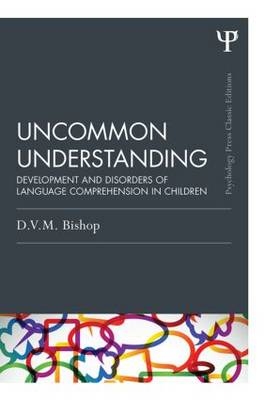
Uncommon Understanding (Classic Edition)
Development and disorders of language comprehension in children
Seiten
2013
Psychology Press Ltd (Verlag)
978-1-84872-150-0 (ISBN)
Psychology Press Ltd (Verlag)
978-1-84872-150-0 (ISBN)
This is a 'classic edition' of Dorothy Bishop's award-winning textbook on the development of language comprehension, which has been in print since 1997, and now includes a new introduction from the author. The book won the British Psychological Society book award in 1999, and is now widely seen as a classic in the field of developmental language disorders.
This is a Classic Edition of Dorothy Bishop's award-winning textbook on the development of language comprehension, which has been in print since 1997, and now includes a new introduction from the author. The book won the British Psychological Society book award in 1999, and is now widely seen as a classic in the field of developmental language disorders.
Uncommon Understanding provides a comprehensive account of the process of comprehension, from the reception of an acoustic signal, to the interpretation of communicative intentions, and integrates a vast field of research on language acquisition, psycholinguistics and neuropsychology. In the new introduction Dorothy Bishop reflects on the organization of the book, and developments in the field since the book was first published.
A major theme in the book is that comprehension should not be viewed as a unitary skill – to understand spoken language one needs the ability to classify incoming speech sounds, to relate them to a "mental lexicon," to interpret the propositions encoded by word order and grammatical inflections, and to use information from the environmental and social context to grasp an intended meaning. Another important theme is that although neuropsychological and experimental research on adult comprehension provides useful concepts and methods for assessing comprehension, it should be applied with caution, because a sequential, bottom-up information processing model of comprehension is ill-suited to the developmental context.
Although the main focus of the book is on research and theory, rather than practical matters of assessment and intervention, the theoretical framework presented in the book will continue to help clinicians develop a clearer understanding of what comprehension involves, and how different types of difficulty may be pin-pointed.
This is a Classic Edition of Dorothy Bishop's award-winning textbook on the development of language comprehension, which has been in print since 1997, and now includes a new introduction from the author. The book won the British Psychological Society book award in 1999, and is now widely seen as a classic in the field of developmental language disorders.
Uncommon Understanding provides a comprehensive account of the process of comprehension, from the reception of an acoustic signal, to the interpretation of communicative intentions, and integrates a vast field of research on language acquisition, psycholinguistics and neuropsychology. In the new introduction Dorothy Bishop reflects on the organization of the book, and developments in the field since the book was first published.
A major theme in the book is that comprehension should not be viewed as a unitary skill – to understand spoken language one needs the ability to classify incoming speech sounds, to relate them to a "mental lexicon," to interpret the propositions encoded by word order and grammatical inflections, and to use information from the environmental and social context to grasp an intended meaning. Another important theme is that although neuropsychological and experimental research on adult comprehension provides useful concepts and methods for assessing comprehension, it should be applied with caution, because a sequential, bottom-up information processing model of comprehension is ill-suited to the developmental context.
Although the main focus of the book is on research and theory, rather than practical matters of assessment and intervention, the theoretical framework presented in the book will continue to help clinicians develop a clearer understanding of what comprehension involves, and how different types of difficulty may be pin-pointed.
Dorothy Bishop is Professor of Developmental Neuropsychology and a Wellcome Trust Principal Research Fellow at the Department of Experimental Psychology at the University of Oxford.
Preface to the Classic Edition. Foreword. 1. From Sound to Meaning: A Framework for Analysing Comprehension. 2. Specific Language Impairment. 3. Speech Perception. 4. Understanding Word Meaning. 5. Grammatical Knowledge in Sentence Comprehension. 6. Understanding Sentences in Real Time. 7. Understanding Discourse: Integrating Language and Context. 8. Understanding Intended Meaning: Social Aspects of Comprehension. 9. Modularity and Interaction in Language Development and Disorders.
| Erscheint lt. Verlag | 15.7.2013 |
|---|---|
| Reihe/Serie | Psychology Press & Routledge Classic Editions |
| Zusatzinfo | 30 Tables, black and white; 90 Line drawings, black and white; 90 Illustrations, black and white |
| Verlagsort | Hove |
| Sprache | englisch |
| Maße | 156 x 234 mm |
| Gewicht | 542 g |
| Themenwelt | Geisteswissenschaften ► Psychologie ► Biopsychologie / Neurowissenschaften |
| Medizin / Pharmazie ► Gesundheitsfachberufe ► Logopädie | |
| Medizin / Pharmazie ► Medizinische Fachgebiete ► Pädiatrie | |
| ISBN-10 | 1-84872-150-1 / 1848721501 |
| ISBN-13 | 978-1-84872-150-0 / 9781848721500 |
| Zustand | Neuware |
| Haben Sie eine Frage zum Produkt? |
Mehr entdecken
aus dem Bereich
aus dem Bereich
Grundlagen, Klinik, Rehabilitation
Buch | Softcover (2024)
Urban & Fischer in Elsevier (Verlag)
56,00 €
Buch | Spiralbindung (2022)
modernes lernen (Verlag)
29,95 €
Grundlagen, Klinik, Therapie und Verlauf der …
Buch | Softcover (2024)
Kohlhammer (Verlag)
84,00 €


